Introduction: "What is stress? Stress is a ubiquitous presence in our lives, an unwelcome visitor that can disrupt our well-being and harmony. It's a term we often throw around, but do we really understand what stress is and how it can impact us? In this comprehensive guide, we'll take a deep dive into the world of stress, exploring its various forms and the effects it can have on our mental and physical health. We'll also provide practical tips for managing and reducing stress effectively, drawing on insights from the World Health Organization (WHO)."
**Step 1: What is Stress?**
**Understanding Types of Stress:**
1. **Acute Stress:** This type of stress is typically short-term and triggered by specific situations. Examples include public speaking, narrowly avoiding an accident, or taking an important exam.
2. **Chronic Stress:** Chronic stress is the long-term, persistent kind that results from ongoing issues, such as financial problems, work-related stress, or constant relationship difficulties.
3. **Episodic Acute Stress:** Some individuals find themselves in frequent, stressful situations, leading to episodic acute stress. This type of stress can manifest in physical and mental health issues if left unmanaged.
4. **Traumatic Stress:** Traumatic stress results from experiencing shocking and traumatic events, such as accidents, natural disasters, or violence. The effects of traumatic stress can linger for an extended period, sometimes leading to post-traumatic stress disorder (PTSD).
**Physical, Emotional, and Behavioral Manifestations of Stress:**
**Physical Symptoms** may include:
- Increased heart rate and blood pressure
- Muscle tension and headaches
- Digestive problems like stomach aches and irritable bowel syndrome
**Emotional Symptoms** can involve:
- Anxiety and excessive worrying
- Irritability and mood swings
- Feelings of sadness or depression
**Behavioral Changes** might encompass:
- Overeating or undereating
- Increased alcohol or substance use
- Social withdrawal or avoidance
**Step 2: Understanding Stress According to WHO**
The World Health Organization offers a valuable definition of stress: "the reaction people have when presented with demands and pressures that are not matched to their knowledge and abilities and which challenge their ability to cope." This definition highlights the importance of individual perception and coping abilities in the experience of stress.
**The WHO's Insights on Stress**
To gain a deeper understanding of the WHO's perspective on stress, you can refer to their comprehensive article on stress [here](https://www.who.int/news-room/questions-and-answers/item/stress#:~:text=Stress%20can%20be%20defined%20as,experiences%20stress%20to%20some%20degree). The article explores various aspects of stress, including its prevalence, impact on health, and strategies for managing it effectively.
**Step 3: Conclusion**
In conclusion, stress is a fundamental aspect of the human experience. It's not always a negative force, as it can sometimes motivate us to perform at our best. However, chronic or excessive stress can lead to a wide range of physical and mental health problems, making it essential to understand, manage, and reduce stress effectively.
To lead a healthier and more balanced life, it's crucial to recognize the signs and symptoms of stress and adopt appropriate coping strategies. The WHO's extensive resources on stress serve as a valuable source of information for individuals looking to delve deeper into this topic.
By proactively managing stress, we can minimize its negative effects, enhance our overall well-being, and achieve a greater sense of equilibrium in our daily lives. Whether it's through exercise, meditation, therapy, or simply finding time for relaxation and self-care, there are numerous strategies at our disposal to help us better cope with the stresses of life. Remember, understanding and addressing stress is an essential part of maintaining a healthy mind and body.
Certainly! Here are five frequently asked questions (FAQs) related to stress:
**1. What Are the Common Causes of Stress?**
- Stress can be caused by various factors, including work pressures, financial problems, relationship issues, major life changes, and even daily hassles. It's essential to identify the sources of stress to effectively manage it.
**2. How Does Stress Affect Physical Health?**
- Stress can have a significant impact on physical health. It can lead to increased blood pressure, a weakened immune system, digestive problems, and even chronic conditions like heart disease. Recognizing the physical symptoms of stress is crucial for early intervention.
**3. Can Stress Affect Mental Health?**
- Yes, stress can profoundly affect mental health. It's linked to conditions such as anxiety, depression, and even post-traumatic stress disorder (PTSD) in the case of traumatic stress. Understanding the connection between stress and mental health is vital for seeking appropriate help and support.
**4. What Are Effective Stress Management Techniques?**
- There are various stress management techniques, including exercise, meditation, mindfulness, deep breathing, and seeking professional help through therapy. Finding the right strategy to manage stress depends on individual preferences and needs.
**5. How Can I Prevent Chronic Stress?**
- Preventing chronic stress involves recognizing the early signs of stress and taking proactive steps to manage it. This may include setting boundaries, practicing time management, engaging in relaxation techniques, and seeking social support. Identifying and addressing sources of chronic stress in one's life is key to prevention.
These frequently asked questions and their answers can serve as a starting point for individuals seeking to better understand and manage stress in their lives





0 Comments